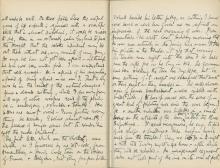Brittain, Vera, Diary, 17 April 1915
Case Study
From Youth to Experience: Vera Brittain’s Work for Peace in Two World Wars
Creator
Brittain, Vera
Source
diary
Date
17 April 1915
Collection/Fonds
Contributer
McMaster University Libraries
Rights
Vera Brittain estate; McMaster University has a non-exclusive licence to publish this document.
Identifier
00000292-2
Language
eng
Type
image
Format
jpg

